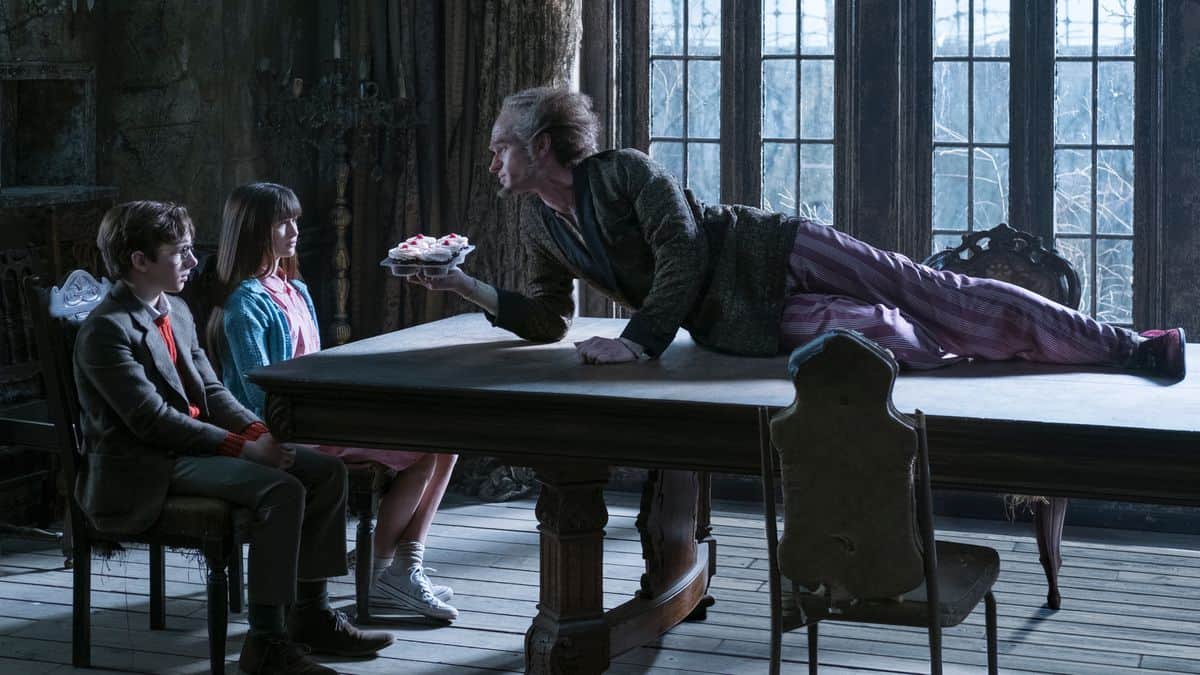If you are interested in articles with happy endings, you would be better off reading something else. In this article, there is no happy ending, no happy beginning, and very little that is happy or spoiler-free in the middle. This is because not many happy things happen in A Series of Unfortunate Events. My name is Sean Barry, and it is my solemn duty to review this series.
***
It is fair to say that I am not a very good person to offer a review on Lemony Snicket’s A Series of Unfortunate Events. This is because I approached it with a great deal of “nostalgic bias,” a term which here means that I read the books on which the series is based as a child and they were some of my favorite stories.
I first ran across the books by happenstance at a school book fair when I was either in fifth or sixth grade. I quickly devoured the books, partially because they were easy reads but also because I found something of value visiting a world where tragic misfortune is not the end. Each book follows the three Baudelaire orphans, Violet, Klaus, and Sunny, as they find themselves in many unfortunate situations, as the title would suggest.
If you’re unfamiliar with the books, the antagonist is Count Olaf — Neil Patrick Harris at his best — the Baudelaires’ first guardian after they become homeless orphans at the hands of a fire. He is constantly after their considerable family fortune which will only be available to them once Violet, the eldest, comes of age. Count Olaf will stop at nothing to get his hands on their inheritance, even killing several of the Baudelaires’ guardians in his mad quest.
He is a sickening character. He thinks only of himself and has the singular focus of stealing their fortune. In contrast, the children simply try to grow up together in a world where nothing is stable for them. They earnestly care for each other, as well as the others around them. And, I loved seeing how the siblings use their talents to better work together and foil his plans at every turn. But, with each successive plot, the circumstances grow more dire and their escape even more tenuous. It is clear that they are never going to completely escape the Count, so how do they adapt? How can they survive?
When I was young, these books gave me a sense of hope 1—No matter what evils or unfortunate events befell the Baudelaire children, there was an underlying sense of hope that they would manage to overcome them, though that hope dimmed with each successive book. At the same time, the mystery and intrigue of their world grew. Why does the tattoo on Count Olaf’s ankle continue to show up? How are all of these guardians related to the children? Who really were their parents?
I found the books fun despite their dark scenarios, and the series neatly captures the darkness and the fun. In the first episode of the Netflix series, Count Olaf says to the children, “You may think I am a terrible person. You haven’t the faintest idea.” Even as this gets fleshed out through the Count’s heinous actions in the books, the other dark elements, the vile characters, and the unfortunate circumstances … it’s still a testament that good can overcome evil. No matter how much power evil seems to have, it is conquerable. In addition, the books taught me how others make pain and misery bearable.
The Netflix series does a marvelous job of capturing these feelings. The scenarios are ridiculous but never out of the realm of possibility, such as Count Olaf pretending to be a sea captain on a lake. (None of the adults can identify him). At times the plot can feel rushed or jokes can fall flat, but the series does a beautiful job of expressing the world the Baudelaire children inhabit. I eagerly await the adaptation of the next books in the series.
***
Of course, I would like to see the children find a stable home in the midst of this series. But that’s not how the story goes. They are doomed to continue this series for an unlucky thirteen tales. If this scenario bothers you, then I suggest you look away and find something more cheerful to occupy your time such as enjoying a walk through the park or some other whimsical activity where misfortune cannot interfere.
- Yes, hope. They also taught me a great deal about the English language through the narrator’s breaks, which taught me the difference between literally and figuratively ↩


